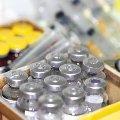This is the VOA Special English Development Report.
Millions of babies and children could soon be protected against the deadly disease pneumonia. Two leading drug companies have agreed to supply vaccines against pneumococcal disease to the world's poorest countries at a reduced price. Pfizer and GlaxoSmithKline signed the historic Advance Market Commitment agreement last week. The Global Alliance for Vaccines and Immunizations, or GAVI, helped negotiate the deal. The group says the low cost vaccines could save as many as seven million lives by the year twenty thirty.
The World Health Organization says pneumonia kills almost two million children each year. This is more than AIDS, malaria and measles combined. It is the leading cause of death among young children. And, more than ninety percent of those deaths happen in the developing world.
These are all reasons why GAVI chose the pneumococcal vaccine for its first Advance Market Commitment project. The private-public partnerships are designed to increase the availability of low cost vaccines in poor areas.
Last year, the governments of Italy, the United Kingdom, Canada, Russia and Norway joined with the Bill and Melinda Gates Foundation. They provided one and a half billion dollars to launch the pneumococcal vaccine project. Jeffrey Rowland is with the GAVI alliance. He says the money helps to persuade drug makers to take part in the project.
JEFFREY ROWLAND: "The biggest challenge of getting life saving vaccines to poor countries is that there's no market. People can't afford them. That's why we don't really have a malaria vaccine yet, because no one in rich countries really suffers from malaria. What we did for the pneumococcal vaccine was we said we will pay one point five billion dollars if you develop the right vaccines, and the right volumes that we need and at the right price. And it was a gamble." That gamble paid off. GlaxoSmithKline and Pfizer have agreed to provide thirty million doses of the vaccine each year for ten years. The first twenty percent of the vaccines will sell for seven dollars a dose. The remaining eighty percent will cost three dollars and fifty cents per dose. That is ninety per cent less than current prices in the United States.
Mister Rowland says the agreement is a huge achievement for the developing world.
JEFFREY ROWLAND: "Vaccination, which we tend to take for granted in countries like the United States or in Western Europe, in fact a lot of us don't even know which diseases we've been vaccinated against. That's not the case in poor countries. Vaccination is a life or death question for poor people and if you can vaccinate a child to prevent a disease from happening it is a lot more cost effective than it is to treat that disease afterwards." And that's the VOA Special English Development Report, written by June Simms. I'm Steve Ember.

